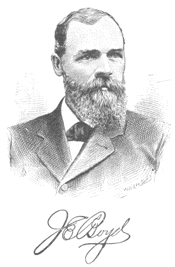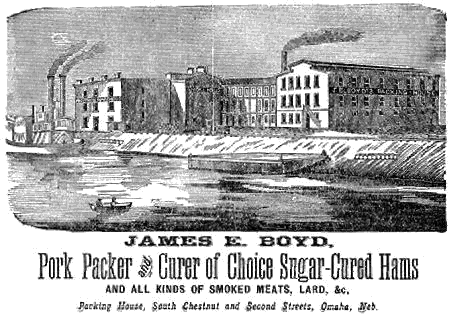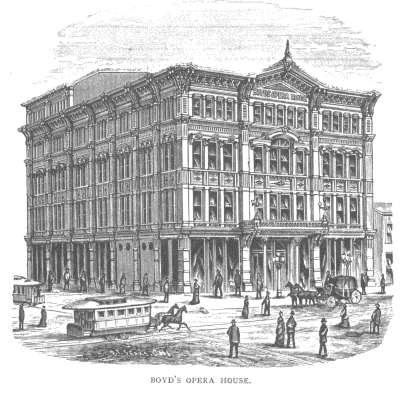

The Boyd County, Nebraska research page is proud to be part of the USGenWeb and NEGenWeb projects.
The USGenWeb project consists of a group of volunteers, working together to provide Internet websites for genealogical research in every county and every state of the United States. This project is non-commercial and fully committed to free access for everyone.
This site
Copyright © 2001 Pamela R. Roy
POriginal Page Creation: July 3, 2001
Website Updated 1/9/2022 by Boyd County Coordinator, Linda Ziemann
Any information found here within this page may be used freely by fellow genealogists. Any commercial use or posting of pages without consent of the author/host of these pages is prohibited.
|
The following biography of James E. Boyd is taken from Omaha: The Gate City and Douglas County Nebraska, Edited by Arthur C. Wakeley (S. J. Clarke, Chicago 1917) Vol. II, pp. 870-872. Hon. James E. Boyd, governor of Nebraska and an honored resident of Omaha, had the distinction of being the only democratic governor elected in the state up to the time when he was called to that office. He was born in County Tyrone, Ireland, September 9, 1834, and at the age of nine years came to America with his parents, who settled in Belmont county, Ohio, where the family remained until 1847, when a removal was made to Zanesville, Ohio. James E. Boyd attended the common schools until thirteen years of age. He then obtained a situation in a grocery store, and afterward began learning the carpenter's trade, which he followed in Ohio until 1856, when he came to Omaha with his brother, John M. Boyd. They arrived here on the 14th of August, 1856, and both brothers entered the employ of the firm of Root & Vischer. After working for three weeks, during which time they were paid three dollars and seventy-five cents per day, they began contracting and building on their own account.
In the spring following they were awarded the contract for the first courthouse of Douglas county, which they completed in 1858, it being situated on Sixteenth and Farnam streets in Omaha -- the present site of the Paxton block. They also built the Congregational church, one of the first houses of worship in the city. In 1857 James E. Boyd became county clerk, but on account of private business resigned the office before the expiration of his term.
In December, 1858, Mr. Boyd established a stock farm on Wood river, Buffalo county, and also engaged in the mercantile business near Fort Kearney. Subsequently he carried on a freighting business across the plains and in 1866 took a contract for grading on the Union Pacific Railroad. In the following four years he graded more than three hundred miles of the line, accumulating thereby a considerable fortune, with which he returned to Omaha upon the completion of the road. From that period forward he was closely identified with the business interests and development of the city. He purchased a controlling interest in the Omaha Gas Works, which he managed for two years. On November 30, 1869, he organized the Omaha &
Northwestern Railroad Company, of which he was elected president. The road is now a part of the Chicago, Minneapolis, St. Paul & Omaha line. He built the road from Omaha to Blair and furnished one-sixth of the capital necessary to build it to Tekamah. In 1870 he helped to organize the Central National Bank of Omaha and he was for some time president of the Omaha Savings Bank.
 Mr. Boyd was the pioneer pork packer of Omaha. He began the business in 1879, killing and packing four thousand five hundred and fifteen hogs, all that could be obtained in this part of the country. Subsequently he built the finest packing plant in the west and when it burned in 1880 replaced it with another in which were killed one hundred and forty-one thousand hogs in 1886. In 1887 he sold the plant and retired from the packing business. For more than thirty years, the leading theatrical buildings in Omaha have borne the name of this enterprising promoter of Omaha's interests. In 1878 the project of building an opera house was first agitated by the people of the city, and in October, 1881, Boyd's Opera House on the northeast corner of Fifteenth and Farnam streets erected at a cost of ninety thousand dollars, was thrown open. It was a magnificent building for the Omaha of those days, and its opening was attended by a ceremonial recognition of its builder's enterprise. This theater was operated successfully and profitably until it was destroyed by fire in the early '90s. On September 3, 1891, Boyd's New Theatre, erected by James E. Boyd at a cost of two hundred thousand dollars, was opened. Mr. Boyd was always a democrat and in the political field attained a national reputation. During his residence in Buffalo county he was elected to represent that county in the legislature that convened July 4, 1866. He was a member of the constitutional convention of 1871, and also that of 1875. In the year 1880 he served in the city council and in 1881 was elected mayor by a majority of nineteen hundred and thirty-nine out of a total vote of about forty-three hundred. During, his administration occurred the great grading strike, and by his prompt, determined action in a trying and dangerous situation Mayor Boyd won general approbation. It was during this administration also that the high license law went into effect in Nebraska, which was enforced in Omaha with great difficulty.
 The present system of paving, curbing, guttering and sewerage was adopted during his term as mayor, after he had made extensive personal investigation of the systems of other cities. In 1885 he was again elected mayor by a large majority. Mr. Boyd received the vote of his party in the legislature of 1883 for United States senator; he was a delegate to the democratic national convention of 1884 which nominated Grover Cleveland the first time for president; for the following four years he was the Nebraska member of the democratic national committee; and in 1888 he was again a delegate to the national convention. During these times he was the head of the Chicago commission firm of James E. Boyd & Brother, a member of the Chicago board of trade and of the New York stock exchange. After an exciting campaign in 1890, Mr. Boyd, democratic candidate for governor, received seventy-one thousand, three hundred and thirty-one votes; Mr. Powers, populist and farmers' alliance candidate, seventy thousand, one hundred and eighty-seven; and Mr. Richards, republican candidate, sixty-eight thousand, eight hundred and seventy-eight. By the face of the returns, the republicans elected all the state officers except governor. Powers contested the election of Boyd, and all the other populist candidates for state offices began contest proceedings against their republican opponents. At the outset the contests were based on the charge of incorrect election returns, but afterward the additional charge was made that Mr. Boyd was not a citizen of the United States and therefore was ineligible to the office; and on this ground, John M. Thayer, the preceding governor, declined to give up the office. It was ascertained that soon after coming to Ohio from Ireland, Mr. Boyd's father had declared his intention to become an American citizen but failed to perfect his citizenship. With Governor Thayer securely locked in the executive rooms at the capitol, surrounded by armed state militia, and with John H. Powers conducting a determined contest against his election, Mr. Boyd went to the capitol and was sworn in and received the recognition of the other state officers. As a result of the canvass of the votes by the legislature Mr. Boyd was declared elected, and on the order of the board of public lands and buildings Governor Thayer vacated the executive apartments eight days after the end of his regular term. He, however, began suit to oust Boyd, and in the following May the state supreme court decided adversely to Boyd, who gave up the office to Thayer. The opinion of the court was written by Judge Cobb, Judge T. L. Norval concurring, while Judge Maxwell dissented, holding that when the territory of Nebraska was admitted to statehood the enabling act operated to make every resident of the territory a citizen of the state. The case was carried to the United States Supreme Court, which decided, February 1, 1892, that when the state was admitted to the Union upon an equal footing with the original states, Mr. Boyd, who had participated in its formation, became a citizen by adoption. Governor Boyd again took possession of the executive offices February 3, 1892, and served with marked ability until the close of his term. When Governor Boyd again assumed his office there was an enthusiastic demonstration in the form of a great public reception. The action of Governor Boyd in vetoing a bill fixing the maximum freight rates on the ground that he believed the reduction of rates was unjust to the railway companies excited much heated controversy, both inside and outside of the governor's party. Mr. Boyd was always a leading member of the Omaha board of trade. He was its president in 1880, 1881 and 1898, and during the latter year, for the first time in its history, the corporation paid a dividend on its stock. During the later years of financial depression Mr. Boyd met with financial reverses, from which, however, he in a measure recovered. For many years he conducted a successful commission business under the firm name of James E. Boyd & Company. On August 22, 1858, Governor Boyd was married at Council Bluffs, Iowa, to Anna H. Henry, who is a native of Hamilton, Madison County, New York, and who survives him, a resident of Omaha. Governor and Mrs. Boyd had five children, but only one is now living, Eleanora, who became the wife of Ellis L. Bierbower, a native of Pennsylvania, who came to Omaha in 1872 and was thereafter active in the public life of the community until his death in 1899. It was on the 30th of April, 1906, that Governor Boyd passed away in his seventy-second year. His life was purposeful and fraught with good results. While his course at times awakened antagonism, as does that of any man who is fearless and outspoken in support of his own convictions, even those who opposed him recognized and admitted his sincerity and felt that neither fear nor favor could swerve him from a course which his conscience sanctioned. Back to the Boyd County, Nebraska Research page. |
